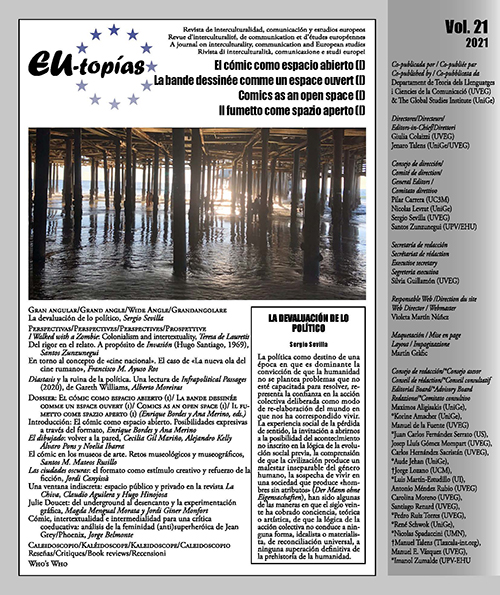I Walked with a Zombie : Colonialism and Intertextuality
DOI:
https://doi.org/10.7203/eutopias.21.21262Keywords:
Wal Lewton, Jacques Tourneur, Jean Rhys, <em>Wide Sargasso Sea</em>, <em>I Walked with a Zombie</em>, Manuel Puig, <em>The Kiss of the Spider Woman</em>. Abstract
Abstract
This article is about some uses of intertextuality between cinema and literature. I Walked with a Zombie (1943) is the second of nine films produced by Val Lewton that shaped the horror genre and had a lasting influence on the language of cinema. Reframing the classic Victorian novel Jane Eyre in a Caribbean setting, the film outlines the fault-lines of the European colonial enterprise long before the advent of postcolonial studies. Jean Rhys’s partly autobiographical novel Wide Sargasso Sea (1966) rewrites Jane Eyre in a feminist and postcolonial perspective. In Manuel Puig’s novel Kiss of the Spider Woman, cinema and films, including I Walked with a Zombie, are the intertextual means to the creation of literary character and the figure of a love that has no name.
 Downloads
Downloads
 References
References
Blázquez, Gustavo. «En carne viva. Algunas notas sobre zombis». Docta–Revista de Psicoanálisis, 10, 2014.
Brontë, Charlotte. Jane Eyre. New York and London: Bantam Classics, 1981.
De Lauretis, Teresa. «Panteridad: vivir en un cuerpo dañado» EU-topías. Revista de interculturalidad, comunicación y estudios europeos, 4, 2012, pp. 9-18.
Gilbert, Sandra and Susan Gubar. The Madwoman in the Attic: The Woman Writer and the Nineteenth-Century Literary Imagination. New Haven and Lodon: Yale University Press, 1979.
Puig, Manuel. Kiss of the Spider Woman, New York: Vintage Books, 1980.
Rhys, Jean. Wide Sargasso Sea. New York and London: W. W. Norton Paperback, 1982 [1966].
Wekker, Gloria. White Innocence: Paradoxes of Colonialism and Race. Durham NC: Duke University Press, 2016.
Downloads
Published
How to Cite
-
Abstract642
-
PDF612
Issue
Section
License
![]()
The authors conserve the copyright. All content published in EU-topías. Journal of interculturality, Communication, and European Studies are subject to the license Creative Commons Attribution-NonCommercial-ShareAlike 4.0 license. The full text of the license can be found at <http://creativecommons.org/licenses/by-nc-sa/4.0>
They may be copied, used, disseminated, transmitted and publicly displayed, provided that:
- The authorship and original source of the publication is cited (journal, publisher and URL of the work).
- They are not used for commercial purposes.
- The existence and specifications of this license of use are mentioned.
It is the responsibility of the authors to obtain the necessary permissions for images that are subject to copyright.



